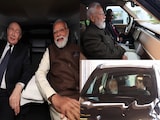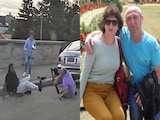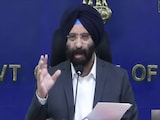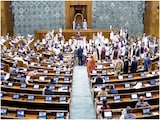Noting that security scenario is changing from geographical to thematic, Union Home Minister Amit Shah yesterday laid thrust on multi-dimensional policing and said police force has to be accessible, accountable and approachable.
The Home Minister, who addressed the convocation ceremony of the 74th batch of Indian Police Service probationers at the Sardar Vallabhbhai Patel National Police Academy here, said no nation can be great without good law and order and impenetrable internal security.
The Home Minister paid tributes to 36,000 police personnel who made the supreme sacrifice for the internal security of the nation at the Martyr's Memorial.
In his address, Amit Shah said that joining the great tradition of IPS, the 74 RR batch of trainee officers will be known as the batch of Amrit Kaal.
He said that during the last seven decades, the country has seen many ups and downs in the field of security and faced many challenges.
He said at the time of establishment of this college, Sardar Vallabhbhai Patel had said it will become an inspiring example for the future generations.
The minister said that goals set by the country's first Union Home Minister for the Academy have been well accomplished during the past 75 years.
A total of 195 officer trainees are undergoing basic course training at the academy, including 41 women officers and 29 officer trainees from Bhutan, Nepal, Maldives and Mauritius.
He said that most of the trainees of this batch have completed their basic qualification in technical fields.
He said Prime Minister Narendra Modi has set up 'Police Technology Mission' to meet the challenges of the future, and empower all the police institutions of the country to be in tune with the global technical challenges from the point of view of technology.
Mr Shah said that the mission will not only make the entire police system from constable to DGP capable to tackle the technical challenges but will also make them tech-savvy. The Police Technology Mission will make all the police institutions of the country in sync with the global technical challenges from the point of view of technology.
He said PM Modi has set a goal for the people of the country that when we celebrate the centenary of independence in 2047, the country should emerge at the top of every field globally.
"Fulfilment of this goal is both the responsibility and duty of every Indian citizen. The IPS trainee officers present here have a special responsibility because no nation can be great without good law and order and impenetrable internal security."
He added that the protection of the rights of the weakest citizen, the sensitivity of the system and a police system that can withstand all the challenges are essential elements to lay the foundation of a developed nation.
He said that the effort is to make India a five trillion dollar economy by 2025 and ensure that India becomes a fully developed nation by 2047.
"It is definitely possible to achieve this goal as in 2014, we were at the 11th position in the world's economic ranking and in a span of just eight years, we have been able to reach at the fifth position."
He said that according to Morgan Stanley estimates, India will emerge as the third-largest economy in the world by 2027.
Amit Shah said that the officer trainees are passing out today after imbibing the Constitution of the country and its spirit.
They must be able to appreciate that the three types of system are essential in constitutional system. The first one is the citizens, which votes once and elects the governance system for five years; second one is the government elected by the citizens for a period of five years and the third one is the selected bureaucracy which serves the country for 30 to 35 years.
He said that the citizen has the right to vote once in five years, the people who get elected work for the development of the country for five years and later have to go back to the public to seek mandate, but the selected officers in the All India Services have the right to serve the country selflessly for 30-35 years.
Mr Shah said that the next 25 years are crucial for the country, as they can help fulfill the dream of a great India envisioned by freedom fighters.
He said when we assess the internal security scenario of the country eight years ago, terrorist incidents in Jammu and Kashmir, insurgency inside the Northeast and increasing violence in the left wing extremism areas, were the three major challenges in front of us.
Now, after eight years, the government has succeeded in countering these three challenges to a large extent, he said.
The minister said that after the abrogation of Article 370, there has been a huge reduction in terrorist incidents in Jammu and Kashmir.
He added that over 8,000 cadres have been brought back to the mainstream by signing a peace deal with many insurgent organisations in the North East.
By filling the security vacuum and cracking down on top Maoist leadership, the number of districts affected by Left Wing Extremism has come down substantially, he said.
Mr Shah said India has showcased a successful example to the world by banning PFI.
He said central agencies and police of all the states of the country have succeeded in banning an organisation like PFI by successful operation in a single day. "It shows the maturity and power of our democracy," he said.
Mr Shah said that under the leadership of PM Modi, the main reasons for the reduction in the incidents of terrorism across the country, are the policy of 'zero tolerance' against terrorism, strong framework of counter-terror laws, empowerment of all agencies and strong political will.
"The global participation of our agencies is also expanding. The holding of the Interpol General Assembly in India and India's leadership in the field of terrorism and finance in No Money for Terror conference symbolises the acceptance of our security agencies globally".
He said that by establishing Forensic Science University, India has tried to fill the expert human resource and logistical gap in the field of forensic science.
The Union Home Minister and Minister of Cooperation said that the security scenario is changing from geographical to thematic and multi-dimensional policing will have to be accepted instead of single-dimensional policing.
"In place of geographical threats like insurgency in Northeast, Left Wing Extremism, communal hotspots, now thematic threats like cyber crime, misuse of data, misinformation are emerging that need to be dealt firmly," he said.
"Earlier there were challenges of terrorism, extremism and day-to-day policing, but now we are faced with multidimensional challenges like terror finance, narco terror, fourth generation information warfare. Our police forces have to be equipped to grapple with them," he added.
He said that a new approach is to be devised by the authorities to counter the challenges and strengthen policing.
"Our focus should be on the security of the country's economic centres, protection of human rights of the poor, evidence-based investigation, evidence-based forensic science, and cracking down on terror links of narcotics, cyber and financial fraud."
Mr Shah said that the police force has to be accessible, accountable and approachable.
Being accessible means bringing a balance between knowledge, skills and approach. "We will have to set an example of accountable policing by imbibing fresh energy and confidence within us and becoming approachable."
He added that the police force will have to address the law and order after understanding the local language, geography and culture.
He said that the soul of the Constitution is the citizens and their rights and the police force has to interpret all the clauses of the Constitution and law, keeping this goal in front.
Officer Trainees will have to move forward by balancing their professional and personal life.
Officers will need to win the trust of the citizens and retain their humanity.
Mr Shah said that it is the responsibility of these officers to ensure welfare of the personnel working on the ground in stress situations, improve welfare measures, being sensitive to them, augment police capacity and ensure that their approach matches the global standards.
The Union Home Minister said on the basis of the three mantras - awareness, preparedness and enforcement - the police technology mission is going to progress ahead.
He appealed to all the trainee officers to be a part of this mission and strengthen it.
He noted that as the head of a police force, it is very important that the officers do not succumb to pressure, take precautions, stay away from fame and at the same time understand the rights and sensibilities of the person sitting at the lowest level.
Mr Shah said that all the officers are not only going out as IPS officers, but are also taking the responsibility of laying the foundation for the centenary year of independence of the country in the coming 25 years.














